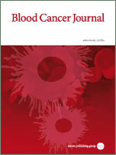
Blood Cancer Journal
Scope & Guideline
Elevating standards in blood cancer studies.
Introduction
Aims and Scopes
- Hematological Malignancies Focus:
The journal primarily addresses various types of blood cancers, including multiple myeloma, acute myeloid leukemia (AML), chronic lymphocytic leukemia (CLL), and lymphomas. This focus allows for a comprehensive understanding of disease mechanisms and treatment outcomes. - Clinical Research and Trials:
A significant emphasis is placed on clinical trials, providing insights into new therapies, treatment regimens, and patient outcomes. The journal publishes studies that evaluate novel drug combinations and treatment strategies, contributing to evidence-based practice. - Genomic and Molecular Insights:
The journal highlights research that delves into the genomic and molecular landscape of hematological malignancies. This includes studies on mutations, gene expression profiles, and the impact of genomic alterations on prognosis and treatment response. - Therapeutic Innovations:
Research on emerging therapies, including CAR-T cell therapy, bispecific antibodies, and targeted therapies, is a core area. The journal aims to disseminate findings that may lead to improved treatment protocols and patient outcomes. - Patient-Centric Studies:
The journal also focuses on patient-reported outcomes and the quality of life of individuals with blood cancers, addressing the psychosocial aspects of treatment and survivorship.
Trending and Emerging
- Precision Medicine and Genomics:
There is a surge in studies focusing on precision medicine, highlighting the importance of genetic profiling and molecular characterization of tumors. This trend reflects the move towards individualized treatment strategies tailored to the genetic makeup of each patient’s cancer. - Immunotherapy Advances:
Research on immunotherapy, including CAR-T cell therapy and bispecific antibodies, is increasingly prevalent. This reflects a broader shift in the treatment landscape, with a focus on harnessing the immune system to combat hematologic malignancies. - Real-World Evidence and Patient Outcomes:
Emerging studies are emphasizing real-world evidence and patient-reported outcomes, showcasing the importance of understanding treatment effectiveness and quality of life in diverse patient populations. - Multi-Omics Approaches:
The application of multi-omics strategies (genomics, transcriptomics, proteomics) to better understand disease mechanisms and treatment responses is on the rise, indicating a trend towards more comprehensive research methodologies. - Health Disparities and Access to Care:
An increasing number of studies are addressing health disparities and access to care in hematological malignancies, highlighting the need for equitable treatment options and outcomes across different demographics.
Declining or Waning
- Traditional Chemotherapy Studies:
There is a noticeable decrease in studies focusing exclusively on traditional chemotherapy regimens. As newer targeted therapies and immunotherapies gain traction, research on older treatment methods is becoming less common. - Efficacy of Standardized Treatment Protocols:
Research on standardized treatment protocols, which previously dominated discussions, is becoming less frequent. The focus is shifting towards personalized medicine approaches that consider individual genetic profiles and responses. - Basic Biological Mechanisms:
While foundational studies on the biology of hematological malignancies remain important, there seems to be a waning interest in purely basic science articles that do not directly translate into clinical applications or therapeutic advancements.
Similar Journals
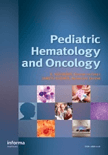
PEDIATRIC HEMATOLOGY AND ONCOLOGY
Exploring breakthroughs in child hematology and oncology.Pediatric Hematology and Oncology, published by Taylor & Francis Inc, serves as a vital platform dedicated to the fields of hematology, oncology, and pediatrics, providing a comprehensive avenue for the dissemination of scholarly research and clinical advancements. With an ISSN of 0888-0018 and an E-ISSN of 1521-0669, this journal has successfully converged its expertise over the years from 1984 to 2024. Ranked in the Q3 category for Hematology and Oncology, alongside a Q2 ranking in Pediatrics, Perinatology, and Child Health (2023), it engages a diverse readership comprising researchers, healthcare professionals, and students eager to explore groundbreaking studies in child health and treatment methodologies. While it currently does not offer Open Access options, the journal is widely cited and recognized, particularly in its specialized fields, fostering a rich environment for dialogue and innovation in the management of pediatric hematological and oncological disorders. The journal is based in the United Kingdom at 530 Walnut Street, Ste 850, Philadelphia, PA 19106, making it an essential resource for those pursuing excellence in pediatric medical research.
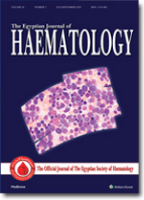
Egyptian Journal of Haematology
Connecting Scholars to Transform Hematology PracticeThe Egyptian Journal of Haematology, published by WOLTERS KLUWER MEDKNOW PUBLICATIONS, stands as a pivotal resource in the field of hematology, particularly within the context of Egypt and the broader Middle Eastern region. This journal is dedicated to disseminating high-quality research that explores the latest advancements in blood disorders, hematologic malignancies, and transfusion medicine. With a focus on original research, case studies, and reviews, it aims to provide a comprehensive platform for hematologists, researchers, and healthcare professionals to enhance their understanding and management of hematological conditions. Although it is not an open-access journal, the rigorous peer-review process ensures that only the most impactful studies are published, contributing to the journal's reputation in the academic community. The Egyptian Journal of Haematology serves as an essential tool for advancing knowledge, improving clinical outcomes, and fostering collaboration among experts in the field.
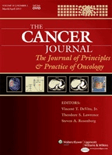
CANCER JOURNAL
Advancing Cancer Research, One Study at a Time.CANCER JOURNAL is a leading peer-reviewed publication dedicated to the dissemination of innovative research in the fields of cancer research and oncology. Published by Lippincott Williams & Wilkins, this journal serves as an essential resource for researchers, clinicians, and students seeking to advance their understanding of cancer mechanisms, treatment strategies, and patient care. With an ISSN of 1528-9117 and an E-ISSN of 1540-336X, it boasts a respectable 2023 Q2 category ranking in both Cancer Research and Oncology, reflecting its impactful contributions to the scientific community. Although it currently does not offer open access, the journal's rigorous peer-review process ensures the publication of high-quality, relevant studies that stimulate further investigation and collaboration among professionals. Since its inception, the journal has evolved through several converged years, maintaining a steadfast commitment to addressing the complexities of cancer biology and treatment. At its core, CANCER JOURNAL aims to foster advancements in oncology, making it a vital platform for sharing pivotal findings that could transform cancer research and therapeutic practices.

Blood and Lymphatic Cancer-Targets and Therapy
Championing Open Access for Global Cancer ResearchBlood and Lymphatic Cancer-Targets and Therapy, published by DOVE MEDICAL PRESS LTD, is a vital open-access journal that has been disseminating crucial research and findings in the field of hematology and oncology since 2011. With its ISSN 1179-9889, this journal focuses on the latest therapeutic targets and innovative treatment strategies for blood and lymphatic cancers, contributing significantly to the advancement of knowledge and practice in this specialized area. Designed for researchers, healthcare professionals, and students alike, Blood and Lymphatic Cancer-Targets and Therapy aims to foster a deeper understanding of cancer biology and promote collaborative efforts leading to novel therapeutic interventions. The open-access model ensures that research findings are readily accessible to a global audience, underscoring the journal's commitment to enhancing patient care and fostering educational growth in the cancer domain.

BLOOD REVIEWS
Connecting professionals through cutting-edge research.BLOOD REVIEWS is a highly regarded journal published by Churchill Livingstone, specializing in the fields of Hematology and Oncology. With an impressive Q1 ranking in both disciplines and placing in the top 10% of its peer categories according to Scopus metrics, it provides an essential platform for the dissemination of cutting-edge research and reviews pertaining to blood disorders and cancer treatment. Since its inception in 1987 and continuing through 2024, the journal has established itself as a cornerstone for healthcare professionals, researchers, and students who seek to advance their understanding of hematologic and oncologic topics. While not an open-access journal, BLOOD REVIEWS retains a reputation for delivering high-quality, peer-reviewed articles that foster dialogue and innovation within the scientific community. For those in the United States and beyond, the journal serves as a vital resource, housed at the Journal Production Department in Edinburgh, Scotland, ensuring accessibility and a global reach in its critical academic contributions.
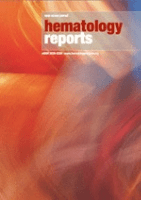
Hematology Reports
Empowering researchers to transform hematology.Hematology Reports is an esteemed academic journal in the field of hematology, dedicated to advancing the understanding of blood disorders and their treatment. Published by MDPI, a leading Swiss publisher known for its commitment to open access since 2009, this journal provides a valuable platform for researchers and healthcare professionals to disseminate innovative findings and foster collaboration within the academic community. The journal features an array of articles ranging from clinical studies to laboratory research, and is indexed in Scopus, where it currently holds a rank of 113 out of 137 in the Medicine - Hematology category, placing it in the 17th percentile. As an open-access journal, Hematology Reports ensures that critical research is accessible to a global audience, supporting the dissemination of knowledge that has the potential to improve patient outcomes. This journal is an essential resource for those engaged in the study and treatment of hematological conditions, encouraging dialogue and the exchange of ideas to enhance clinical practices.
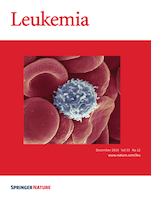
LEUKEMIA
Your Premier Source for Leukemia ResearchLEUKEMIA, published by SpringerNature, is a premier journal in the field of hematology and oncology, with ISSN 0887-6924 and E-ISSN 1476-5551. Established in 1987, this esteemed publication serves as a critical platform for disseminating groundbreaking research and comprehensive reviews on the pathophysiology, diagnosis, and treatment of leukemia and related hematological disorders. With a distinguished impact, it holds a top-tier status in several categories, including Q1 rankings in Anesthesiology and Pain Medicine, Cancer Research, Hematology, and Oncology for 2023. The journal is globally recognized for its rigorous peer-review process and is highly regarded among academia, evidenced by its impressive Scopus rankings—7th in Hematology and 24th in Oncology. Researchers, clinicians, and students alike will benefit from the rich content that this journal offers, making it an invaluable resource in the fight against leukemia. The main objective of LEUKEMIA is to advance knowledge and encourage further innovations within the field, ensuring that vital insights reach practitioners and researchers around the world.

Journal of Hematology
Elevating Hematology Through Collaborative ResearchThe Journal of Hematology, published by ELMER PRESS INC, serves as a pivotal platform for disseminating cutting-edge research in the field of hematology. With an ISSN of 1927-1212 and an E-ISSN of 1927-1220, this journal is committed to advancing scientific knowledge and clinical practice through high-quality peer-reviewed articles encompassing all aspects of blood disorders, from basic science to health policy implications. While the journal currently operates under a traditional access model, it nonetheless prioritizes the rapid publication of significant findings, ensuring that researchers, clinicians, and students have timely access to the latest advancements in hematological research. Positioned to bridge gaps in knowledge and foster collaboration among scholars worldwide, the Journal of Hematology is an essential resource for anyone invested in this vital area of medicine.
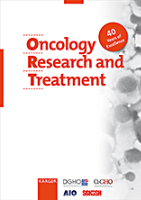
Oncology Research and Treatment
Uniting researchers to combat cancer effectively.Oncology Research and Treatment, published by KARGER, is a highly regarded academic journal dedicated to advancing the field of oncology through rigorous research and clinical insights. With a history spanning from 1978 to 1997 and continuing from 2013 to 2024, this journal provides a vital platform for researchers and professionals in cancer research, hematology, and related disciplines. Though currently listed in the Q3 tier of 2023 for Cancer Research, Hematology, and Oncology, its growing readership and open access policy enhance its visibility and impact within the scientific community. Based in Switzerland, the journal features diverse access options, reflecting the global importance of oncology research. With a focus on innovative treatments and the latest methodologies, Oncology Research and Treatment plays a crucial role in fostering collaboration and dialogue among researchers, professionals, and students alike, helping to shape the future of cancer care and management.
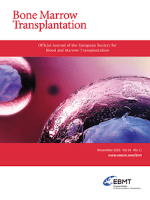
BONE MARROW TRANSPLANTATION
Leading the Charge in Cutting-edge Transplantation Research.BONE MARROW TRANSPLANTATION, published by SpringerNature, stands as a leading journal in the fields of Hematology and Transplantation, as evidenced by its recognition in the Q1 category for both disciplines according to 2023 rankings. With an impressive impact factor and notable Scopus rankings—7th out of 54 in Medicine Transplantation and 25th out of 137 in Medicine Hematology—this journal is instrumental for researchers and professionals dedicated to advancements in bone marrow transplantation practices and research. Established in 1986, the journal publishes original research, clinical studies, and reviews that push the boundaries of current knowledge, making it essential reading for those looking to stay abreast of the latest developments in the field. Although offering limited Open Access options, BONE MARROW TRANSPLANTATION reaches a broad audience and furthers a global dialogue on best practices and innovative approaches in transplantation medicine. Its address in London, UK positions it at the heart of international research collaboration, fostering connections among scientists, clinicians, and students alike.